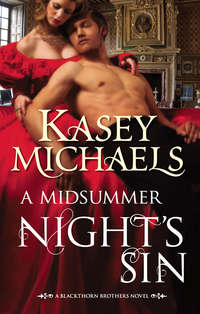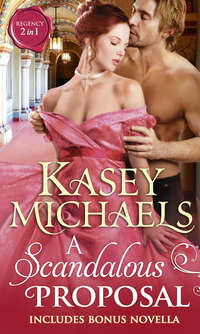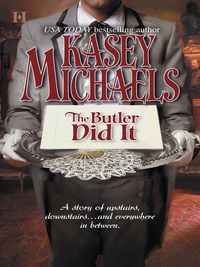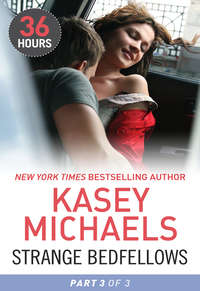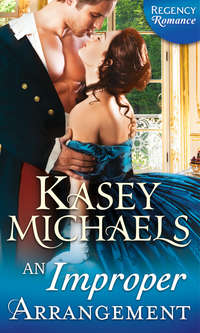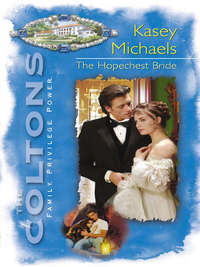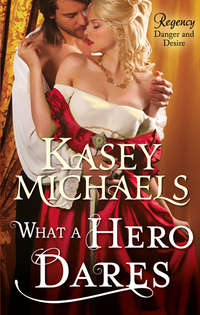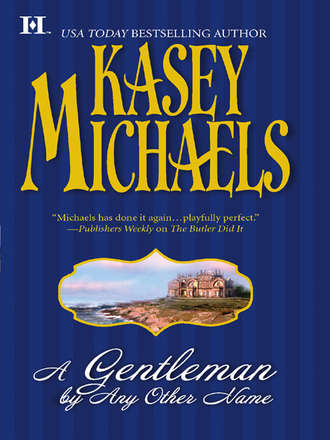
Полная версия
A Gentleman By Any Other Name
“Not if you have any pity for me, Miss Carruthers. The thing is close to an abomination, you know. Even that ridiculous bun is less offensive to the eyes.”
Julia went to raise a hand to her hair but caught herself in time. “One would assume you, too, were a motherless child, Mr. Becket, as that was quite an untactful remark.”
Chance did not smile. “Wait for me here, Miss Carruthers, doing your best to keep any opinions to yourself.”
Julia gave herself another short, pithy sermon on the benefits of knowing her place while also taking the time to munch on another slice of ham and tuck a roll into the pocket of her gown before her employer returned and led her out onto the street.
He turned to the left and then guided her around the side of the large building, down a gravel pathway to a bench that overlooked the River Medway. Or the River Wen. Julia only knew that Maidstone had been built on the banks of both waterways. Until the horrible mail coach ride to London that now seemed two lifetimes ago, she had never strayed more than a few miles from Hawkhurst, except for occasional trips to Rye with her father.
She sat, raising her face to the sun while she listened to the flow of water through the wheel of the mill on the opposite shore, the song of birds overhead…and concentrated on not thinking about the man sitting beside her. And there were flowers; flowers everywhere. Maidstone had been touted as the Garden of England, and now she knew why. “I still can’t smell the Channel, but we will tomorrow. How near is Becket Hall to the water?”
“All but too near when the tide comes in during a winter storm,” Chance said, a mental portrait of Becket Hall forming in his mind. “My father loves the sea.”
“And you don’t?”
This woman turned his every spoken word into a question about him. How did she do that? “I’ve sailed. Now, you’ll be with Alice at most times, but I know my family. They’re extremely informal and they’ll wish to include both of you in their day-to-day lives, so you’d best be prepared for that.”
Julia could sense tension building in the man, from his posture to the tone of his voice. “You disapprove?”
“It’s not up to me to approve or disapprove. Only to explain. My father, Ainsley Becket, is still a rather young man. We’re not his children by blood, you see, except for Cassandra. In truth, I only refer to Ainsley as my father when I’m in society, because that’s easier than constant explanations. Ainsley never leaves the Marsh, you understand, and has never been to London. In any event, Ainsley was a man of business in the islands for many years and simply acquired the rest of us from time to time.”
Julia was absolutely fascinated. “He adopted you there? In the islands, you said? Islands in the Caribbean?”
“Adopted, purchased, scooped up—yes, he did. I’m not disclosing any secrets here, for you’d soon realize that the Beckets are a rather mixed assortment. I am the oldest, although Courtland likes to believe himself our keeper, and Cassandra is the youngest. The rest all fall somewhere in between, whether thinking of their ages at the time they became a part of the household or when they were born.”
Julia, having grown up as the only child in her father’s household, often envious of her friends and their many brothers and sisters, was eager to hear more. “How many of you are there?”
Chance wished he hadn’t begun this conversation, but the woman should know what she was facing. “Eight, other than Ainsley. Quite the menagerie. Court, Cassandra, myself. My sisters, Morgan, Eleanor and Fanny. My brothers, Spencer and Rian. So you under stand, Alice will not want for company.”
Julia’s head was spinning as she attempted to digest so much information given so quickly. All those names. Too many names. “I’m sure she will be delighted. But all those people. Becket Hall is probably enormous?”
Chance watched as a V of ducks slid across the current toward the shore. One in the lead, the rest following in that V, all neat and tidy and regimented. So unlike his family, his house, all of their lives.
He could never run far enough to get away.
“Becket Hall is large, yes. Large and rambling and fairly ugly.” He stood up. “Shall we go?”
Julia got to her feet. “I believe I’ll sup with Alice in our room this evening, sir. When shall we be ready to travel tomorrow morning?”
Chance ran a hand over his hair. “That’s my decision? I hadn’t planned on abdication, you understand, but I have begun to believe I’ve been overthrown. Shall we say eight?”
Julia smiled. “I think eight is a perfect time to continue our journey, sir.” And then she gave in to curiosity yet again and pushed for more information. “Why, you may even have time to say your hellos to your family and still be back on the road to London early the next morning.”
“A plan that would please me straight down to the ground, Miss Carruthers, much as that obviously disgusts you. But we both remember the amount of luggage I have brought with me. It turns out that I have matters to attend to up and down the coast, so I will be staying at Becket Hall—or at least returning to it every few days—until such time as I can escape to London.”
“Really?” Julia said, trying to sift through the feelings his information had aroused, decide if they were feelings of joy or discomfort. “Alice will be very pleased, sir.”
“Oh, yes,” Chance said, then sighed, mentally picturing his brother Court’s reaction to the news. “Everyone will be extremely pleased. Good day to you, Miss Carruthers. Don’t remain outside without your cloak or you’ll take a chill. I refuse to consider the prospect of being compelled to interview yet another nanny.”
Julia watched him walk away, heading downstream along the bank, his hands clasped behind his back. Another woman might be intrigued by the man. The bereaved husband. The harassed, unknowledgeable but sincere father. The wretchedly handsome man with the brooding eyes and the full mouth of a soul who had been born for passion and adventure, even if he seemed woefully unaware of that fact. A man who’d seen an exotic place like Haiti, had even lived there. How? As a poor, orphaned boy at last discovered by Ainsley Becket and given a new but clearly unhappy life?
Yes, any woman would be intrigued, fascinated. Any woman would want to hold him, comfort him, help him.
Well, almost any woman.
Julia Carruthers longed to run after him and give him a good push in the back, sending him toppling headfirst into the river.
CHAPTER FOUR
CHANCE TOOK JACMEL for a run early the next morning, knowing the only way to keep the animal to a steady pace would be to first wipe away the memory of being locked in a strange stall all night. He then spent most of the day on Jacmel, either cantering ahead of the traveling coach or waiting by the roadside for it to catch up with him again, until he at last pushed into the coach to ride sitting beside his daughter.
It was dark now. Alice was soundly asleep. And Billy—had Julia Carruthers put the fear of God into the man?—had slowed to carefully pick their way through the moonlight over the last miles to Becket Hall.
A maddening day. A wasted day. And yet a lovely luncheon with Alice, who could chatter away nineteen to the dozen about everything and anything.
And all of that time, for every moment of the day, Chance had been unable to block Julia Carruthers from his mind. She was a servant, yes, but more than that, she was a woman. She might not be a society miss, but she probably knew more of her bloodline than he did of his; most anyone would. She was no worse than he, probably a good deal better, even if she had hired herself out as a child’s nurse and he was living in a fine house in Upper Brook Street, dressing in custom-tailored clothes and holding a fairly important post in the War Office.
He was the man he had made. A gentleman, in name if not by birth.
He rarely thought of the young Chance anymore, the ragged, barefoot boy who had angled for pennies on the wharf and slept wherever he could. He’d been known only as “Angelo’s brat,” until Ainsley.
He’d moved so far beyond that life, both in the islands and here in England.
But every turn of the coach wheels took him closer to Becket Hall, and the memories refused to go back where they belonged, into the far recesses of his brain. He blamed Julia Carruthers for that, although he knew such reasoning to be ridiculous.
Ainsley would like Julia Carruthers, damn him.
Yes, he publicly referred to Ainsley as his father and the others as his brothers and sisters, but in his mind all he saw was the end, that last day, that last memory. He would never forgive Ainsley that last memory.
Build a life, watch that life be destroyed. Love and refuse to love again. Protect yourself, adhere to the rules, refuse to be vulnerable or dependent again. Never, never trust.
Those were the lessons of that last memory. All of that. And Isabella’s smile…
Julia cried out when Billy sawed on the reins. The horses all but plunged to a stop and she was tossed into Chance’s arms from the other side of the coach.
“What on earth…?”
“Cow-handed fool!” Chance tried to disengage himself, but he had reflexively thrown out one arm to keep a sleeping Alice from tumbling to the floor of the coach, so that he could barely steady Julia with the other as she scrambled to right herself.
Julia had been dozing and was really only half-awake now as she pushed against him with her hands to right herself.
“Ooof! Miss Carruthers, please, for the love of all that’s holy—”
“I’m sorry, sir. So sorry,” she said, feeling her cheeks growing hot and blessing the darkness that hid that fact. “What happened? Why have we stopped?”
“Two very good questions, both of which Billy may be able to answer if my hands are not wrapped too tightly around his scrawny neck,” Chance said, opening the door and jumping down onto the uneven ground. “You stay in the coach with—oh, never mind,” he finished as Julia jumped down to stand beside him. “Billy? Billy!”
“Here, sir!”
“He’s there,” Julia said, pointing past the horses. “There, in the road. He’s bending over something.”
“Making it easier for me to boot him in the hindquarters. Is it too much for me to ask you to stay here while I investigate further, Miss Carruthers?”
“Probably,” she said, knowing she should be agreeing with him, climbing back into the coach. “But Alice didn’t waken and there’s nothing out here anywhere save the road, the marsh and us. No trees, barely anything that could even be called a hill. What could be in the road? A sheep?”
“I suppose we could stand here and debate the matter, but I suggest I—we—do the obvious and go look,” Chance said. He offered Julia his arm because otherwise she might trip over something in the darkness, and the woman was enough of a problem to him now without adding a sprained ankle to her list of detractions. “Oh, wait a moment more. Stand here while I get a pistol from the coach.”
“You think the sheep is armed?” Julia ignored both the offer and the order as she lifted her skirts and made her way past the horses to where Billy was standing very still in the roadway.
“Billy?” she asked, then realized that the coachman was staring quite intently, not down at the roadway but over to one side, where the marsh grasses grew waist-high.
“I’m that sorry, miss. I didn’t used to be such a looby,” Billy said, then slowly raised his hands up over his head. “He said not to do this until you came looking, miss.”
Julia’s eyes had become more accustomed to the darkness, and now the moonlight helped illuminate the scene in front of her.
She could see that Billy had shot his hands into the air because a young man kneeling in the marsh grass was holding a large, ugly pistol directed at the coachman’s chest.
The dark object in the road was really two dark objects, both of them human forms, neither of them moving. Julia went to her knees in front of the closest figure, who seemed little more than a boy.
“Lower your weapon, boy,” Chance said from somewhere behind her. “Yes, I can see you, and by the way that pistol’s shaking in your hand, I believe I’m the better shot. Billy, stop acting the looby. Lower your arms and relieve the halfling of his pistol before he hurts himself.”
“Me, sir? Begging your pardon, sir, but a pistol is a pistol, even in the hands of a boy. And this one’s cocked.”
“Oh, for pity’s sake,” Julia said, looking first to Billy, then to the young man, who shook as he held the pistol, and lastly to Chance, who looked quite dangerous. And not at all afraid. She wished she could say the same, but she was actually terrified…which had the happy result of making her very, very angry. “We’ve got two boys bleeding to death in the road and no time to worry about who is the better shot, for clearly the best shots have already been taken. Billy, never mind the pistol. Fetch a lantern from the coach.”
“Hoppin’ right to it, miss!” Billy said, then turned and ran back toward the coach, directly disobeying Chance’s order.
Chance continued to hold out his cocked pistol, even though he knew he was too far away to do more than aim, pray and shoot, probably hitting the infuriating Miss Carruthers, who had gotten to her feet in order to walk around one body to the other. “Miss Carruthers, if you would do me the courtesy of standing still—”
But she was down on her knees again, a hint of moonlight illuminating her blond hair but not her features that remained a shadowy profile as she looked up at the third man. Boy. Very nearly boys, all three of them, not men. And one of them would never grow to manhood. “I’m so sorry. I can’t help this one, but I may be able to help the other, if you’ll let me.”
“Georgie? Georgie’s dead?” the boy said, then called out, “Georgie! Georgie, you’re not dead!”
Chance took the opportunity to advance toward the group and remove the aged pistol from the terrified boy’s hand. “Did you shoot him?”
The boy dropped the pistol and turned wild eyes on Chance, speaking between sobs. “No, sir! They shot him. Two of ’em. They shot our George and our Richard. They shot at us when we wouldn’t give ’em the tubs and Georgie told ’em to bugger off. We dropped the tubs and ran. We ran forever till we lost ’em. Then Georgie fell, right here. And Dickie, too. We never should have done it. We should have waited—what am I goin’ to tell our mam?”
Julia listened to the boy even as she pushed aside the dark blue smock on the wounded Dickie to see the even darker ugly hole in his shoulder. “Help me turn him, Mr. Becket, please,” she said, as the boy was unconscious, his breathing shallow.
“What?” Chance had lowered his pistol as he listened to the third youth’s sorry tale, not paying much attention to Miss Carruthers except to note that she certainly did seem to enjoy the role of heroine. “What the devil are you doing?”
“Trying to save this boy’s life, obviously. He’s been running and all the while bleeding like a stuck pig,” Julia said as Billy stood above her holding one of the large lanterns he’d taken down from the side of the coach. “I think the ball went straight through, but I want to be sure. Billy—hold the lantern closer while Mr. Becket and I turn Dickie and have a look. Mr. Becket? Your assistance, please?”
Was there any choice? Besides, the third youth was sitting on his haunches now, sobbing; he’d be no further trouble. Chance put down the pistol and dropped to his knees, carefully lifting the unconscious boy enough to roll him onto his side. “Well, Miss Carruthers?”
“In one side and out the other, Mr. Becket. I think he simply fainted, probably because he’s lost so much blood.”
And she was right, as Dickie roused quickly enough a few minutes later when Julia poured the contents of Chance’s flask over the wound, the boy coming up wide-eyed and yelling for his mam.
By now the second coach had caught up with them, and as Billy and Chance stood guard in case the boys had been pursued, Julia rummaged in her portmanteau for an old slip and tore some of it into strips she tied around the cleaned wound.
“Are we far from Becket Hall, Mr. Becket?” she asked as she sat back on her heels, looked up at him in the moonlight. “We need to take Dickie with us. And poor George, as well. How is John?”
“John? You mean the one over there, retching into a ditch? Clearly past managing anything at all useful. You know these boys are smugglers, don’t you?”
“Yes, I heard John mention tubs. Tea or brandy, do you suppose? Well, it’s of no matter. They came afoul of someone, didn’t they? What nonsense, to be just three of them out here on the Marsh.”
Chance smiled a not-quite-amused half smile. “I suppose when you are out smuggling, you only travel in groups of ten or more.”
“Ten? I should say not. More like dozens, Mr. Becket. Only a fool doesn’t align himself with one of the gangs. And I have not run with the freebooters, sir, although I would lie if I said I didn’t know many of them and haven’t heard their stories. Poor Georgie,” she said, looking at the body sprawled facedown in the road. “He couldn’t have been more than seventeen, could he? His poor mam.”
Chance glanced up at the moon. “And now you want me to transport all three of them to Becket Hall. Feed them, hide them, endanger my family with their presence. Has it by any chance occurred to you, Miss Carruthers, that I am a representative of the king and that the proper place for my two prisoners is Dover Castle? Dover Castle, then on to London where they will either be hanged and gibbeted or duly whipped and transported.”
Julia put a hand on Dickie’s shoulder, easing him back onto the ground. “He doesn’t mean that,” she said soothingly, then got to her feet to all but go belly to belly with Chance Becket. “If you’re quite done putting the fear of king and courts into these poor boys?”
“Oh, bloody hell,” Chance said. “Billy!” he called out, still looking at Julia. “Get the boy and have him help you load his brothers into the second coach. I want to be moving again in five minutes.”
“Ah, now, sir, couldn’t Nathan be takin’ up the other end with me? Big, strappin’ boy, Nathan.”
Chance looked toward the groom, then toward the weeping boy. His jaws tightened as he remembered the time when, no more than fifteen himself, his wrong move had cost another man his life and how Ainsley had driven the lesson home. “No. He’ll be less inclined to reckless acts after carrying his own dead brother. There are some weights a boy must live with if he’s to learn to be a man.”
Billy nodded. “Rodolfo. Right you are, sir. I’m just gettin’ old and soft.”
“And growing deaf, as well. I told you to get the boy and load the others.” Then he gave Billy a pat on the shoulder as the man shuffled off.
“Thank you, sir,” Julia said, totally confused by the exchange between Chance and Billy but knowing enough not to ask any of the many questions that had popped into her head. Such as, who was Rodolfo? And what so-sober memory did Billy and Chance share? So she merely watched, her heart aching for the boy, as Billy and a sobbing John picked up Georgie by his wrists and ankles and carried the body back along the road.
She’d seen dead bodies before, seen wounds before, but she was not nearly so calm as she pretended to be, because she’d always had her father by her side and in charge. Far easier to follow orders than to be responsible for giving them, responsible for the person needing her help.
“Dickie told me he and his brothers had gone to retrieve their small share of a larger run,” she told Chance, feeling the need to fill the silence between them, speaking quickly, probably saying too much. “No one was supposed to do that until the entire gang could assemble tomorrow night, meet up with the land carriers. But Georgie wouldn’t hear of that for some reason or other. These two men John spoke of must have spied them out and followed them. Now the entire haul may be lost, not just their portion of it, and the gang will be forced to find a new hiding place for freshly landed goods. A mess all around. Dickie and John had best be gone from the Marsh before anyone else knows what happened. His mam and any other family, as well.”
Chance cocked one eyebrow at her, rather amazed by her knowledge and her deductions, not to mention her cool head in the midst of this crisis. “Obviously you’ve been giving all of this some considerable consideration. You expect retribution from the boys’ compatriots?”
“Don’t you? Freebooting is a desperate business and demands total secrecy. Through their eagerness, Georgie and his brothers may have lost the entire proceeds of a smuggling run. Possibly tons of goods, all paid for and brought to shore, hidden. Considerable work and cost are involved, sir. Someone will be very unhappy and want revenge. Dickie made mention of a black ghost but then quickly begged me to forget I’d heard what I’d heard.”
“That would probably be wise. Excuse me,” Chance said tightly and went after John, who was now wringing his hands and crying yet again. He took the boy roughly by the elbow and steered him into the tall grass beside the narrow roadway. “Stop wailing like a little girl. Stand up straight and look at me. Your brother told the lady about a black ghost. Now you’re going to tell me.”
John’s eyes went wide. “Oh, no, sir. He did no such thing. None of us never would, sir. Dickie’s just hurtin’ bad, that’s all. He never said that.”
Chance ruthlessly squeezed the boy’s upper arm. “Dover Castle, boy. Ever see a body hanging in gibbet chains? The blacksmith comes and fits you for your very own set. Grown men have been known to keel over dead just seeing the smithy come at them with the measuring stick. And it all starts at Dover Castle. I know the way—you and your brother could be there by morning. Of course, with that hole in him and with no one to doctor him, he’ll be dead soon and you’ll probably hang alone. Crying and pissing your pants as they drag you to the rope, your mam there to watch.”
He gave the boy’s arm a shake. “Tell me.”
“We…we travel with him now, sir. The Black Ghost. Him and his men protect us from the others. From this side of Camber to Appledore and all the way to Dymchurch, sir. We’re almost all together now, with the Black Ghost watchin’ over us.”
“Is that so?” Chance did his best to control his breathing, his temper. “The others, John. And who are the others? The ones who came after you?”
“I can’t say, sir.” When Chance squeezed again, John rushed into speech. “I don’t know, sir, that’s what I mean. Hundreds of them, all together. From Lunnon-town, we think. We had to join together, too, or else lose everything. We’re the Black Ghost Gang now, sir. We can’t say it because nobody is to know but us. Never say Black Ghost, sir. Dickie never should have said that. But Georgie, he said we didn’t need to listen to nobody what won’t even show his own face and…oh, sir, what do I tell our mam? Georgie was her favorite of all of us.”
Remembering what Julia had said, Chance asked, “How many of you are there?”
Johnnie wiped his runny nose on the sleeve of his smock. “Twelve, sir. Da’s gone, drowned on a run these two years past, but there’s still twelve of us.” He half choked on a sob. “E-eleven, sir. And now they seen us. They know who we are. Now they can find us. We’re all going to be dead, like Georgie. Mam and Dickie and me, even the little ones. The Black Ghost can’t help us now. Maybe the Black Ghost will even want us all dead, too. We was told to stay away until tomorrow night and we didn’t listen. What should I do?”
“Christ,” Chance muttered, then pulled the boy roughly into his arms. He let John weep against his shoulder while he told himself this boy was nothing like he had been years ago, when he knew that wasn’t true. Desperate was desperate, no matter what the cause. Desperation was a taste, a smell, a fear you took to bed with you at night and woke with again in the morning.
“We really should be goin’ on, sir,” Billy said, grinning as he dug one booted foot into the stones. “I’ll take young Johnnie off your hands, now that you’re done teachin’ him a lesson and all.”


